Automotive Pump Market Research, 2032
The global automotive pump market size was valued at $16.4 billion in 2022, and is projected to reach $27 billion by 2032, growing at a CAGR of 5.5% from 2023 to 2032.
Report Key Highlighters:
- The automotive pump market study covers 14 countries. The research includes regional and segment analysis of each country in terms of value ($million) for the projected period 2023-2032.
- The study integrated high-quality data, professional opinions and analysis, and critical independent perspectives. The research approach is intended to provide a balanced view of global markets and to assist stakeholders in making educated decisions in order to achieve their most ambitious growth objectives.
- Over 3,700 product literature, annual reports, industry statements, and other comparable materials from major industry participants were reviewed to gain a better understanding of the market.
- Johnson Electric Holdings Limited, Continental AG, Robert Bosch GmbH, Valeo, GMB Corporation, Schaeffler Technologies AG & Co. KG, Mitsubishi Electric Corporation, Aisin Seiki Co., Ltd. , MAHLE GmbH, Aisan Industry Co., Ltd are the major manufacturers of the automotive pumps in the industry. The companies have adopted strategies such as product launches, contracts, expansions, agreements, and others to improve their market positioning.
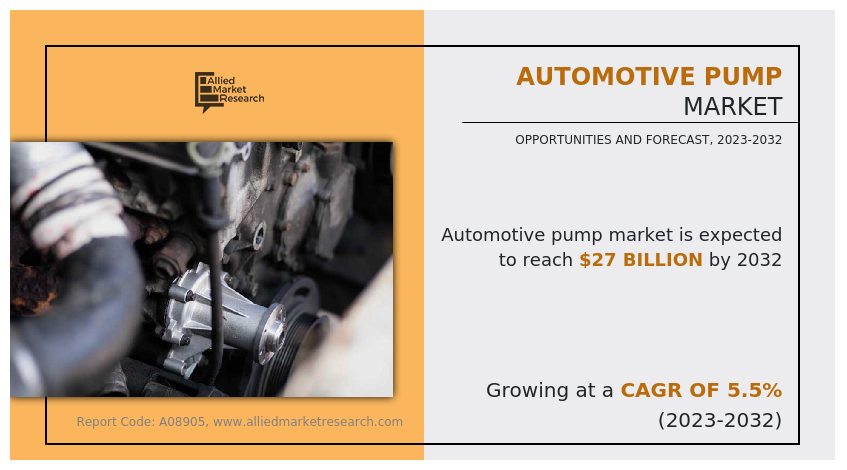
Automotive pumps are devices to facilitate the transfer or movement of fluids within the systems of a vehicle. These devices ensure the operation of various automotive components such as engine and others. Some of the automotive pumps include fuel pump, water pump, vacuum pump, fuel injection pump and others.
Modern vehicles are equipped with cutting-edge technology and intelligent features that comply with the most stringent safety, quality, emission, and performance criteria. Vehicle manufacturers are incorporating a variety of advanced technologies such as power steering, gasoline direct injection, gasoline turbochargers, and automatic transmission into their vehicles where there is requirement for pumps to maintain the overall performance of the vehicles. These are the major automotive pump market trends that are aniticipated to boost the market growth in the forecast period.
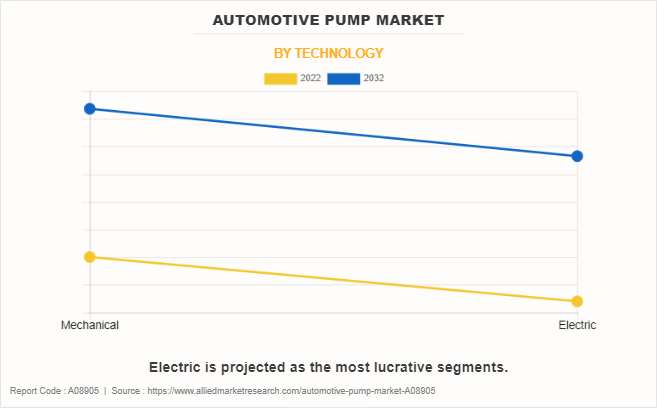
The growth of the global automotive pumps market is driven by several factors, including rising fleet of electric and hybrid vehicles, stringent government regulations on emission norms. However, fluctuations in the prices of raw materials hamper the market growth. In addition, technological advancement in automotive pumps, development of autonomous vehicles presents significant opportunities for market expansion.
In addition, the surge in the production and sales of vehicles, coupled with growing urbanization, infrastructure development, and the need for energy-efficient vehicles are driving the requirement for automotive pump market share. The hybrid electric vehicle demand across the globe is anticipated to witness a strong growth rate during the forecast period due to rising environmental concerns and fuel saving. Recent technological advancement has resulted in the development of hybrid vehicle technology for SUVs and larger-size vehicles, which are significantly propelling the growth of the automotive pumps.
The automotive pump market is segmented into type, vehicle type, technology, sales channel, and region. On the basis of type, the market is classified into fuel pump, water pump, vacuum pump, fuel injection pump, others. On the basis of vehicle type, it is categorized into passenger vehicle, and commercial vehicle. By technology, the market is divided into electric, and mechanical. On the basis of sales channel, the market is segmented into OEM and aftermarket. Region-wise, it is analyzed across North America, Europe, Asia-Pacific, and LAMEA.
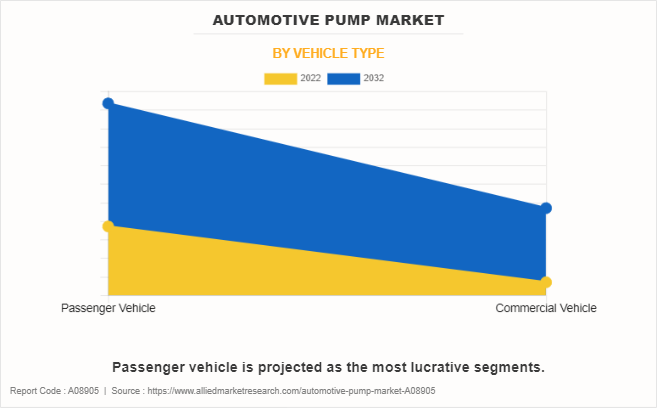
The automotive pumps market in Asian countries has witnessed significant growth and is poised to offer compelling opportunities in the coming years. Rapid industrialization and a growing logistics industry in the Asia-Pacific region are driving up demand for commercial vehicles which in turn is driving the demand for efficient pump.
Key Developments in Automotive Pump Industry
The leading companies are adopting strategies such as acquisition, agreement, expansion, partnership, contracts, and product launches to strengthen their market position.
- In December 2020, Aisin Seiki Co., Ltd. expanded its production unit by introducing a factory which manufactures small and medium sized pump products. Electric water pumps are produced in this plant.
- In January 2022, Aisan Industry Co., Ltd. acquired Denso Corporation under which DENSO is set to transfer all aspects of its operations related to the development, production, and sale of fuel pump modules to Aisan. Through this acquisition the companies are enhancing their competitive edge in powertrain and positioning themselves for growth in future areas.
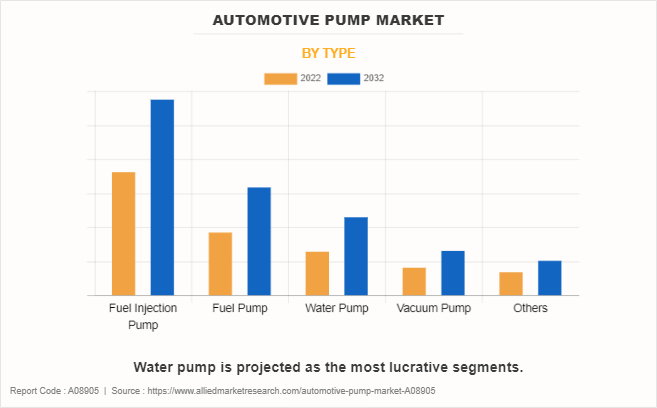
Rising fleet of electric and hybrid vehicles
Surge in vehicle electrification, hybrid vehicles, smart mobility services, elevated fuel prices, and the growing inclination towards non-fossil fuel-based vehicles contribute to the expansion of the electric vehicle market. Automotive pumps are a key component in the cooling system of cars as the pumps utilize centrifugal force to pressurize and move liquids, such as water and coolant, to aid in removing heat from the car's engine and batteries.
Rising emphasis from cities and governments on sustainable transportation solutions has driven the growth of electric and hybrid vehicles. This aims to mitigate carbon emissions and enhance air quality in a concerted effort to address environmental concerns. For instance, according to International Energy Agency (IEA), global electric car sales exceeded 10 million units in 2022, indicating a 35% increase in 2023, reaching a total of 14 million units. This remarkable surge in sales signifies a substantial rise in electric cars' market share of 4%. These factors are projected to lead to surge in deployment of pumps due to their functionality of heat dissipation.
Stringent government regulations on emission norms
There are stringent government regulations incorporated for emission norms in vehicles. For instance, in 2023, India is set to introduce updated emission standards for vehicles, with the government implementing more rigorous BS6 norms, also recognized as Real Driving Emissions (RDE) norms. The revised regulations mandate car manufacturers to display real-time emissions data for their vehicles. The pumps are used to control carbon dioxide emissions with improvement in overall vehicle design.
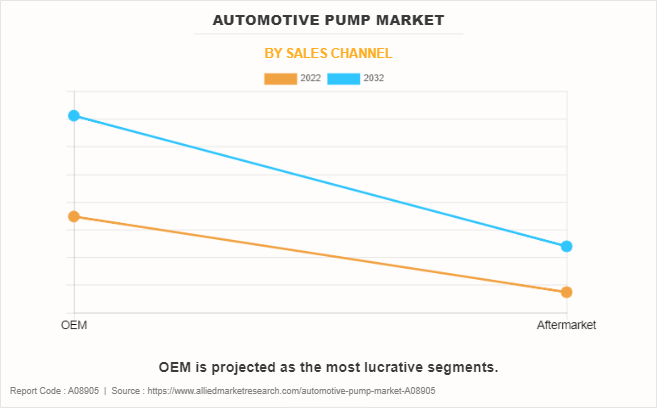
With growing environmental concerns, governments and environmental agencies globally are enacting stringent emission norms and laws to reduce vehicle emission. In April 2023, the European Parliament and the Council passed Regulation (EU) 2023/851, which modifies Regulation (EU) 2019/631 to enhance the CO2 emission performance standards for new passenger cars and new light commercial vehicles, aligning with the heightened climate ambition of the European Union. The regulations set by the government are aiming to reduce greenhouse gases. Carbon dioxide is one of the major greenhouse gases, due to which advanced pumps are used for vehicle engines such as electric pumps, water pumps and others, which is impacting the market growth positively.
Fluctuations in the prices of raw materials
Rubber, polymers, and metals are among the elements that make up automotive pumps. These materials are acquired from a variety of suppliers across the globe. Cost changes are common owing to the supply chain disruptions.
The automobile pumps are directly impacted by increases in the price of raw materials. Maintaining profitability is a common struggle for manufacturers, particularly when they are bound by contract or the demands of the automotive pump industry to keep costs from being passed on to consumers. Therefore, during times of high raw material prices, the profit margins of pump producers decrease. Automotive pump producers frequently look for long-term supplier relationships and use strategic sourcing techniques to reduce the impact of changes in raw material prices in order to solve these price fluctuations which hampers the market growth. Moreover, creating cutting-edge pump technologies, particularly for electric and hybrid vehicles need a significant engineering expertise. All these elements contribute to the overall expenses of development.
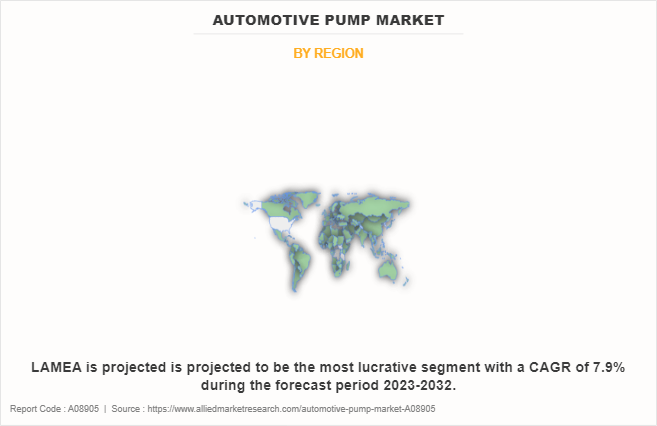
Technological advancement in automotive pumps
Technological advancement has led to the adoption of more efficient pumps such as electric fuel pumps. These pumps provide enhanced efficiency along with high-pressure fuel systems, meeting the requirements of engines. Increase in global concerns regarding the negative effect of climate change along with alarming pollution levels recorded in major cities have created a significant demand for electric vehicles. This involves electric vehicles that do not use gas and are more economical than conventional ones. This in turn, has driven the demand for advanced pumps.
The demand for fuel-efficient vehicles has increased recently, owing to rise in the price of petrol and diesel. This is due to depleting fossil fuel reserves and growth in tendency of companies to gain maximum profit from oil reserves. Thus, these factors give rise to the need for advanced fuel-efficient technologies, leading to a surge in demand for pumps for vehicle parts production.
Key Benefits For Stakeholders
- This report provides a quantitative analysis of the market segments, current trends, estimations, and dynamics of the automotive pump market analysis from 2022 to 2032 to identify the prevailing market opportunities.
- The market research is offered along with information related to key drivers, restraints, and opportunities.
- Porter's five forces analysis highlights the potency of buyers and suppliers to enable stakeholders make profit-oriented business decisions and strengthen their supplier-buyer network.
- In-depth analysis of the market segmentation assists to determine the prevailing market opportunities.
- Major countries in each region are mapped according to their revenue contribution to the global market.
- Market player positioning facilitates benchmarking and provides a clear understanding of the present position of the market players.
- The report includes the analysis of the regional as well as global market trends, key players, market segments, application areas, and market growth strategies.
Automotive Pump Market Report Highlights
| Aspects | Details |
| Market Size By 2032 | USD 27 billion |
| Growth Rate | CAGR of 5.5% |
| Forecast period | 2022 - 2032 |
| Report Pages | 300 |
| By Type |
|
| By Technology |
|
| By Vehicle Type |
|
| By Sales Channel |
|
| By Region |
|
| Key Market Players | Valeo, Johnson Electric Holdings Limited, Mitsubishi Electric Corporation, MAHLE GmbH, AISIN SEIKI Co., Ltd., Schaeffler Technologies AG & Co. KG, Aisan Industry Co., Ltd., Robert Bosch GmbH, GMB Corporation, Continental AG |
Passenger vehicle is the leading application of Automotive Pump Market.
Asia-Pacific is the largest regional market for Automotive Pump Market.
$16 billion is the estimated industry size of Automotive Pump Market.
Johnson Electric is the top company to hold the market share in Automotive Pump Market.
Loading Table Of Content...
Loading Research Methodology...



